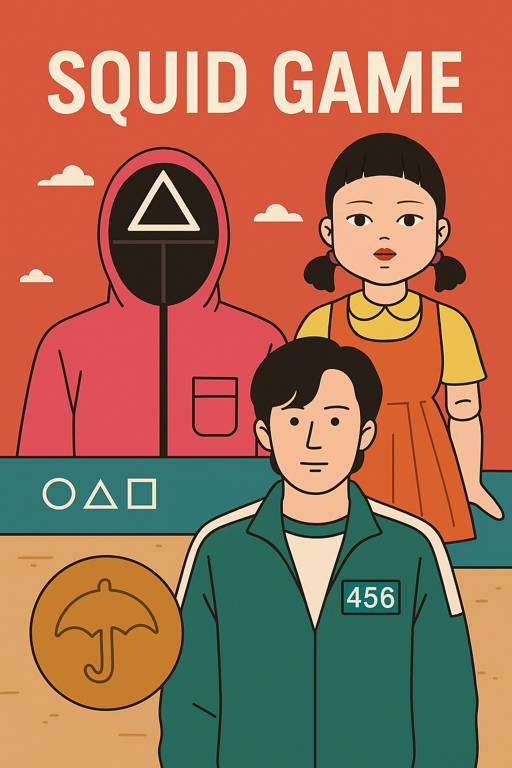Introduction: A Global Phenomenon from South Korea
When “Squid Game” (오징어 게임) premiered on Netflix in September 2021, no one expected its massive success. It became the most-watched series in the platform’s history. In just weeks, this South Korean dystopian thriller captivated millions worldwide. Its compelling storyline, unforgettable visuals, and haunting critique of capitalism drew a massive audience.
Created by Hwang Dong-hyuk, Squid Game is more than just another survival drama. It is a global cultural moment. The series combines Korean storytelling, symbolic imagery, and brutal realism. These elements expose the darkest corners of modern society.
Plot Summary: Childhood Games Turned Deadly
The story follows Seong Gi-hun, a down-on-his-luck gambler drowning in debt, who is offered a mysterious chance to win 45.6 billion won (about 38 million USD) by participating in a secret game. Desperate for money, he joins 455 other players. They are all similarly impoverished or desperate. They compete in a series of childhood games with a deadly twist.
Each game is deceptively simple: Red Light, Green Light. Tug-of-War. Marbles. But failure means death.
As the competition unfolds, the players form alliances and face moral dilemmas. They confront the horrifying question: What would you do to survive?
Core Themes and Symbolism
1. Critique of Capitalism
At its core, Squid Game is a brutal allegory for modern capitalist society. It portrays a system where the poor fight each other for crumbs. The wealthy elites, masked VIPs, watch this for entertainment.
The players are not forced into the game; they consent. But their consent is hollow, driven by economic desperation and systemic inequality. This mirrors how, in real life, people are pushed into harmful systems because they have no viable alternatives.
2. Childhood vs. Adulthood
The use of Korean children’s games adds an ironic layer. These games evoke nostalgia — yet in the show, they become instruments of violence. This juxtaposition emphasizes how innocence is weaponized, and how societal systems turn play into punishment.
3. Moral Ambiguity and Human Nature
The characters must make impossible ethical choices, such as betraying friends or sacrificing others to survive. This moral ambiguity drives much of the show’s emotional weight. It forces the viewer to ask:
Is survival worth losing your humanity?
Character Highlights
- Seong Gi-hun (Lee Jung-jae): The emotional anchor of the series. A flawed but empathetic man seeking redemption.
- Cho Sang-woo (Park Hae-soo): A childhood friend of Gi-hun and a brilliant man whose moral compass slowly erodes.
- Kang Sae-byeok (Jung Ho-yeon): She is a North Korean defector. She fights for her family and is one of the most globally beloved characters.
- Abdul Ali (Anupam Tripathi): A migrant worker from Pakistan whose kindness contrasts sharply with the cruelty around him.
- Oh Il-nam (Player 001): The elderly man with unexpected secrets that redefine the meaning of the game.
These multidimensional characters ground the show’s dystopian premise in raw human emotion.
Global Impact and Cultural Significance
- #1 on Netflix in over 90 countries
- Over 1.65 billion hours viewed in the first 28 days
- Inspired Halloween costumes, TikTok trends, fan art, and even university-level discourse on economics and ethics
- Elevated Korean pop culture (Hallyu) to new heights in the West
- Made Jung Ho-yeon an international fashion icon and Lee Jung-jae a globally recognized actor
The show sparked conversations about student debt, labor rights, mental health, and immigration. Its messages prove that they transcend language and geography.
Awards and Recognition
- Emmy Awards (2022):
- Outstanding Lead Actor in a Drama Series – Lee Jung-jae (First Asian actor to win)
- Outstanding Directing – Hwang Dong-hyuk
- Nominated for Best Drama Series
- Golden Globe:
- Best Supporting Actor – O Yeong-su (Player 001)
- Screen Actors Guild Awards:
- Outstanding Performance by a Male Actor – Lee Jung-jae
- Outstanding Performance by a Female Actor – Jung Ho-yeon
These accolades mark Squid Game as the first non-English language show to break through widely. It also did so deeply in the Western awards circuit.
Comparison with Similar Series
| Series Title | Country | Theme | Language |
|---|---|---|---|
| Squid Game | Korea | Capitalism, survival, morality | Korean |
| Alice in Borderland | Japan | Survival games, dystopia | Japanese |
| The Hunger Games | USA | Dystopian control, rebellion | English |
| Black Mirror | UK | Tech-driven social critique | English |
Squid Game sets itself apart with emotional depth, cultural specificity, and real-world relevance.
Season 2 and Legacy
Following its immense success, Season 2 is officially in production. Director Hwang Dong-hyuk has confirmed the return of key characters. He also mentioned expanded narrative arcs. Fans worldwide are eager to see how the story will evolve. They are particularly interested in Gi-hun’s transformation. They also want to learn the secrets behind the game’s organizers.
More than just entertainment, Squid Game has redefined what international storytelling can achieve. It proves that language is no barrier to emotional and thematic resonance.
Where to Watch
- Netflix (Worldwide) – Available with subtitles and dubbed in over 30 languages
- Official Merch and Soundtrack – Available via Netflix Shop and digital platforms
- Parody & Analysis – YouTube, TikTok, Reddit communities discuss theories, symbolism, and cultural context
Final Thoughts: Survival, Humanity, and the Price of Desperation
Squid Game is not just a K-drama — it is a cultural artifact of our time. It combines Korean storytelling mastery with social critique. The unforgettable visuals create a show that lingers in your mind long after the credits roll.
In an increasingly unequal world, Squid Game forces us to ask:
What would you do for a second chance?
